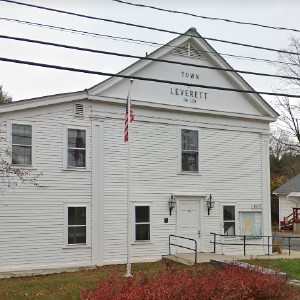Northampton School Committee says Superintendent Bonner ‘needs improvement’ on evaluation

PORTIA BONNER
| Published: 08-13-2024 6:09 PM |
NORTHAMPTON — Fretting over one’s grades is a universal part of the public education experience, a worry that even school superintendents sometimes find themselves having to go through.
After Superintendent Portia Bonner’s first year, the Northampton School Committee voted last week to give her a “Needs Improvement grade” – the second lowest rating in the evaluation rubric provided by the state Department of Elementary and Secondary Education to assess superintendents. The evaluation was performed by a subcommittee that consisted of School Committee members Ann Hennessey of Ward 5, Margaret Miller of Ward 6 and At-Large member Gwen Agna, who serves as vice chair of the larger committee.
A draft of the evaluation obtained by the Gazette shows Bonner, who objected to the rating at the Aug. 8 School Committee meeting, being evaluated on four standards: instructional leadership, management and operations, family and community engagement, and professional culture. Those standards are further broken down into “focus indicators” that are graded to determine the overall rating.
Although Bonner received several “Proficient” marks, she received “Needs Improvement” on two focus indicators, one dealing with the budget for the schools and regarding communication toward staff and caregivers.
The evaluation comes after a turbulent school budgeting process last spring that included widespread public protests and pressure on the city and school administration to prevent job cuts. The final version of the budget led to the elimination of around 20 positions, although two were later restored following higher than expected funds allocated to the district in the final state budget.
The fight over the budget at one point included the Northampton Association of School Employees union filing a motion of no confidence in Bonner, accusing her of failing to properly advocate for the school district due to her support of staff-cutting budgets and what it characterized as “bureaucratic pandering” toward the mayor’s office.
Bonner had in turn said the no-confidence voted showed a “lack of courtesy,” and the School Committee ultimately affirmed its support for Bonner in response to the vote.
In reviewing Bonner’s process for crafting the school budget, the committee’s evaluation credited the superintendent for starting the budget process early and noted that her first-look budget in January closely resembled the final budget determined by the city. But the committee faulted her for failing to effectively communicate her vision and priorities for her budget plan.
Article continues after...
Yesterday's Most Read Articles
“The school committee gave feedback to her proposed budget, asked questions, and gave input in decision-making regarding the budget,” the evaluation states. “The superintendent did not effectively communicate the budget rationale to the community, or municipal stakeholders particularly at the first meeting of the city council. Many community members were confused and the city council asked her to return to further explain.”
The evaluation also faulted Bonner for her defensive responses to the community during conversations over the budget, leading to her second “Needs Improvement” focus indicator.
“The tenor of the budget conversation in the community has made it hard to have open and trusting communication,” the evaluation states. “An area of improvement for Superintendent Bonner would be to work to take time to reflect before communicating in a tense interaction, and to try to respond less defensively, that includes in-person communication.”
Bonner, who was present at the Aug. 8 School Committee meeting, objected to the overall rating, saying it was not truly indicative of what she has done for the district in her first year of service.
“This document makes it look like I have done absolutely nothing this year,” Bonner said. “Needs Improvement, in the world of evaluation, says that I literally did nothing that was any type of success in this district and that’s what that rating has given me … by choosing that rating, that says that I am less than.”
Agna said she “certainly wouldn’t want us on record” that Bonner has done nothing for the district in her first year, but said she could not give Bonner the higher “Proficient” rating based on the overall evaluation.
“We decided we couldn’t do a ‘Proficient’ because the definition of proficient practice is understood to be fully satisfactory,” Agna said. “So when we see that there were some ‘Needs Improvements,’ that’s where we made the decision.”
In an interview, Agna further clarified that although Bonner had received several marks of “Proficient,” state education department guidelines mandated that because Bonner received a “Needs Improvement” on multiple focus indicators of the evaluation standards, it warranted an overall “Needs Improvement” mark on her evaluation.
“It was hard not to give her a ‘Proficient,’” Agna said. “We all struggled with that.”
Miller also emphasized that the “Needs Improvement” mark was not indicative of an overall poor performance in Bonner’s first year as superintendent.
“We were only using the categories they gave us and ‘Needs Improvement’ meant needs improvement in a couple of areas,” Miller said during the meeting. “It doesn’t mean that there aren’t many areas in which there was success.”
In addition to the four standards, Bonner’s evaluation also included three goals set out at the beginning of the previous school year the superintendent was tasked with: the development of a new multiyear strategic plan, developing skills an a new superintendent induction program, and working with principals and other school leaders on existing goals for the district. The evaluation determined Bonner had met the first two respective goals, while making “significant progress” on the third goal.
Michael Stein, a Ward 4 School Committee member who staunchly opposed the job cuts, said he wasn’t surprised by the evaluation.
“A lot of the concerns were around communication, defensiveness and the way in which some of those things have been handled that have I think exacerbated tensions and issues in the community,” he said.
Once a final draft of the evaluation is completed, the committee said it will further detail its decision-making process behind the evaluation at a later meeting. The committee will also meet with Bonner to go over an improvement plan for the coming school year and set new goals for Bonner in her second year presiding over the district.
Alexander MacDougall can be reached at amacdougall@gazettenet.com.






 ‘Whole campus’ approach: UMass working to help six students whose visas, status were revoked
‘Whole campus’ approach: UMass working to help six students whose visas, status were revoked  ‘Hands Off’ protest: 5,000 people in half-dozen Hampshire County communities protest against Trump policies
‘Hands Off’ protest: 5,000 people in half-dozen Hampshire County communities protest against Trump policies  Q&A with UMass President Marty Meehan
Q&A with UMass President Marty Meehan Leverett will consider accepting 147-acre working forest at May’s town meeting; public hearing this Thursday
Leverett will consider accepting 147-acre working forest at May’s town meeting; public hearing this Thursday
